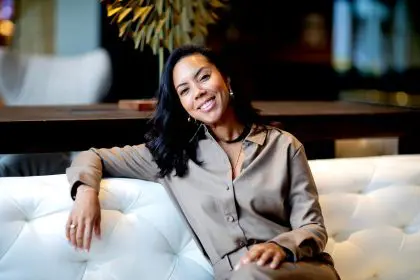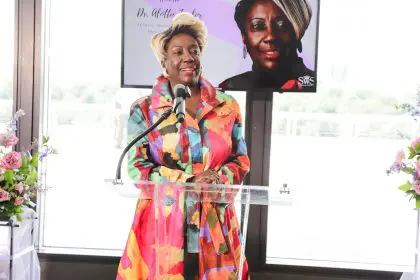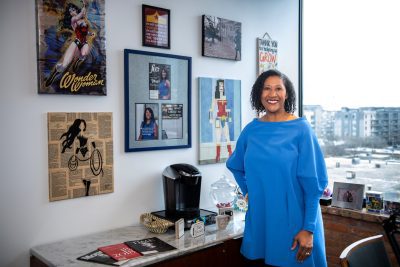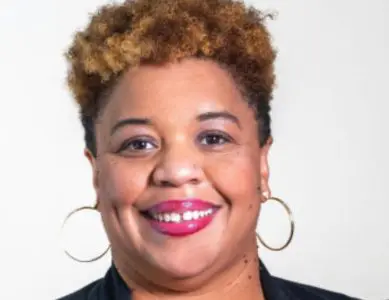In a compelling interview for Rolling Out’s “Sisters with Superpowers” series, Ashley Etienne, one of the nation’s most accomplished communication strategists, opens up about her remarkable journey from the suburbs of Houston to the corridors of power in Washington, D.C. Known as the “Queen of the War Room,” Etienne’s career spans roles as a trusted advisor to President Barack Obama, President Joe Biden, Vice President Kamala Harris, and Speaker Nancy Pelosi. Her story is a masterclass in determination, strategic thinking, and the power of calculated risk-taking.
What led you to a career in political strategy and communications?
When I was a young person, I remember my father and I traveled from the suburbs of Houston into the city of Houston, and I asked him, ‘Well, why do these people live in their neighborhoods look different than ours?’ And he said, ‘It’s because a lot of decisions are made for them in Washington,’ and it was the ‘for them’ that bothered me as a young person, I think I was probably around the age of 6, and so I decided I wanted to go to Washington, well, he said, ‘if you want to change things, you need to go to Washington and do it’.
I had no idea how to get to Washington, but I was hell bent from a young age on going to Washington representing my people, and so after I graduated college, didn’t do any internships, my parents didn’t write any big checks to any political figure, I just jumped on a plane, wrote out 5 members of Congress, wrote out why they should hire me, which is probably the beginning of my communications career, knocked on their doors, got 3 offers, chose a member who I knew likely was not gonna win a U.S. Senate bid in Texas as a Democrat, we’re still trying to win that one, and that’s not been successful yet, because I knew then if I chose his office, I would go right to the top, and so I quickly went from the front desk person to the Communications director in a year or so.
It was sort of trial by fire, on Capitol Hill and in politics people don’t sit down and mentor you, and they don’t sit down and show you the ropes, and when I started, there were no people that look like me that were doing communications, so I was very much a trailblazer, but what I learned is that when you think about building an effective communications message and strategy, it’s all about knowing your audience. Knowing the other person who you’re trying to communicate, understanding their motivations, what drives them, what sort of pulls at their heart, what their main concerns are, how they live their lives, how they consume information, and I think, once you intimately know your audience, it becomes easier to develop a message.
Now to penetrate with that message requires a level of discipline, requires a level of consistency and credibility, and also, I think, having a messenger that resonates with that audience, all of those things are essential when you think about driving a successful message and communication strategy.
What are your thoughts on message credibility, and being able to penetrate the message?
I think this last election in November was almost a perfect storm, and some of the factors we weren’t going to overcome as a party. I mean incumbents lost globally all over the world, incumbents lost, although Kamala Harris was a challenger, she was very much still an incumbent. She was representing a presidency, and there was a drag on that presidency, I don’t think we lost any credibility with the audience. If you look at it, we won many in the battleground states those down ballot races, we lost the top of the ticket, which is the Presidency, so we did lose credibility.
The other thing is, I don’t know if you’ve ever tried to do it, it’s hard to win an argument in a battle with a liar, and so what Donald Trump did was, he went out there every day, stoking fears, stoking racial fears, lying about his record, about Joe Biden’s record, and about who Kamala Harris is, and it’s hard to overcome that, that’s one factor. The second factor is you’ve got tremendous amount of misinformation in people’s phones, right in our feeds, and that’s where most people live their lives every day, get their information from their feeds, and you’ve got domestic and foreign agents in our feed, pumping us with bad information. You’ve got other outlets like Fox News and others that are perpetuating a lot of these misinformation in these lies by Donald Trump.
It’s hard to overcome that type of environment, especially when you have a hundred days, so in a hundred days you had to introduce a candidate, you had to overcome your negatives and then persuade people to vote for you. I mean, it’s gotta have been the hardest thing as a communicator to try to achieve in such a short period of time, but I think Kamala Harris and that team ran an exceptional race, but again they were against some really crazy, overwhelming headwinds that were hard to overcome, but the reality is, and this is a question I think you were getting at as well, which is, it doesn’t end in November.
Like those factors still exist, you still have the President that’s out here spewing lies. You still have a president that’s stoking fear and anxiety around everything, from the economy to race, to gender to transgender, and then you’ve got, still as a major factor, misinformation, and that’s coming from domestic agents as well as foreign agents. So it’s an incredible uphill battle that we’re that we’re on right now.
What do you consider your superpower?
The way that I’ve sort of crafted my career is, I’m the one that always runs to the fire, I want to take on the hard task, I want to go where nobody else wants to go. Primarily, Valerie Jarrett sort of put it succinctly about me, which was that I like to put myself in the center of the action, and when you do that, that really tests your limits and your capabilities of your talents, it stretches you in ways that being comfortable won’t, it surrounds you by the A-Team whenever there’s a crisis, there’s always the best people that are in the center of that crisis. So you’re learning and developing relationships with the best people at their craft.
Then again, it’s trial by fire, I always tell people – people always ask me, ‘What was it like working for Pelosi, especially during those Trump years?’ I’m like, ‘It’s iron sharpens iron.’ And so I’ve always put myself in the center of the action, and that’s part of the advice that I give young people that want to rise. Valerie made a great point – she’s like, because even if you fail, people will still know who you are, and you’ll come out better for it than if you decide to take the comfortable road. So sort of putting myself in the center of fire has prepared me, to your point, of being in these really intense, high-pressured, high-stakes environments, and keeping my cool while there.
I think when I think about my superpower, I really think it is taking calculated risk, I got on an airplane to come to Washington, I didn’t know anyone, I didn’t know how the town worked, but I said, ‘I’m going to do it.’ There are different points, whether it’s from the first impeachment that I ran of Donald Trump to the Government shutdowns, or the war against women – I was always the one that said, ‘Let’s go for it. Let’s roll the dice. Why not? What do we have to lose?’
Typically, I’ve gotten fortunate I guess, it’s always worked out for the better, so for me, it’s all about putting yourself in the center of the action to sharpen your skills and make you best, and then my superpower is really taking those calculated risks. Most people are risk-adverse, people don’t want to take risk, but it’s understanding your opposition, understanding their motivation, what drives them, and once you understand all of that, you kind of understand their pressure points, their vulnerabilities, all of those things, so it becomes easier to actually take those calculated risks.
How do you navigate the storms that come with ascending in your career?
There were definite times when I was unsure, a moment that comes to mind is when I was really running the opposition for Pelosi against Donald Trump, and nothing was sticking. I mean he was like Teflon, like everything we threw at him, none of it stuck, and I remember going to my policy director’s desk, Dick Meltzer, and saying to him, I put my head in my hand and did sort of the ultimate sin in politics, I started to cry. ‘It’s not working, Dick, it’s not working, we’re not gonna beat this guy.’ And he says to me at the time, ‘You’re trying to do something that no one else has done, you’re trying to take out the Emperor, why did you think it was going to be easy?’
I remember also, in this same time period, Pelosi continually saying, ‘You’ve got to know your power, I brought you back here from the Obama White House because we’ve equipped you, you’re ready, but you’ve got to know, and if you don’t figure it out you’ve got to go, it’s one or the other, cause what we’re dealing with is bigger than Donald Trump, so if you cannot in this moment understand why I brought you back, then we’re going to have to ask you actually.’
So that forced me to think through, ‘Well, what? Why am I here? What do I have to offer?’ And so what was helpful to me is to really take an assessment of all the successes and failures I had over my career and identify, ‘Okay, what makes me exceptional, aside from the experience, but in terms of the skill set, what makes me different from anybody else in the field?’
What I’ve learned in those moments, those very tough moments, is that I have to be convinced of it myself first, before anybody else can be convinced of it, and what I really hate and dislike most is this notion of the imposter syndrome. I tell young people all the time, ‘Listen. If the door open for you, you’re supposed to walk through it. Your only job is to be prepared to walk through that door.’ So, rather than spending the energy obsessing about what you’re not, take that energy and channel it into being prepared and bettering yourself, either shoring up your weaknesses, strengthening your strengths for that table.
And that’s how I’ve always sort of journeyed through my career, was understanding, again, what are my strengths, having those at the forefront of my mind, and what value do I add in each one of those rooms. I’ve worked for each one of the most powerful transformative figures in modern history, and each one of those rooms and those tables and places, and those teams are all very different. So when I arrive at a room, I look around, look left and right, take an assessment of who’s there, and then figure out to myself, ‘Well, why did Barack Obama hire me? Why did Nancy hire me? Why did Kamala hire me? What do I have to offer that’s different from all these other people here? What value am I adding to this table?’
Because again, someone invited me to the table for a reason, I just got to be convinced of what that reason actually is, and the other key to it is, if you don’t know, ask, again, people hire you for a reason, the Vice President called me for a reason. So, understanding from her what that was about, and she started by saying, ‘Your reputation precedes you.’ Okay, that’s a good start, that’s a great start.
Can you talk about navigating the storm that Vice President Harris was about to enter and how to navigate challenges as you ascend in your career?
Each environment brings different challenges obviously, I think what I was referring to for her was, she was a first, first woman, first woman of color in that job. She was sort of what people naturally thought as next, she was this sort of heir apparent. So I knew that everyone from conservative right wing media to members on The Hill, to even those who thought they should be the heir apparent, were going to be coming for her and trying to undermine her.
So some of the things, I think, as you think about entering and going into new spaces and places, and thinking through the storm, a couple of things are important. One is building your foundation, what I call for her, infrastructure, who are your allies? Who’s going to support you? Who’s going to be those people that are going to invest in you in those big and small moments, and late at night when you’re unsure? My Dick Meltzer, who’s going to be that person you can go to their desk and actually cry, and they give you a pep talk, shaking by your shoulders, turn you around and push you out there and say, ‘You got it kid, you can do this.’
I will advise folks and young people to not make any assumptions about who those people can be, I mean, many oftentimes we want them to look like us, but many times they’re actually not, they don’t look like us, but you should fully embrace anyone who wants to invest in you.
The other thing is building you a kitchen cabinet outside of the workplace that you can turn to to give you advice in all kinds of situations. So if you’re a political communicator like me, there are people who’ve been involved in politics that aren’t communicators that I call on all the time and say, ‘Hey, how are you seeing this from the outside? Tell me what I’m missing here.’ I have a pastor, I have professional businesswomen that aren’t in politics at all, and all of those sort of different people at that one table give me different perspective on what I’m dealing with. Each one of them play a different role, I don’t ask the same question of everybody, but developing that kitchen cabinet and having it be very diverse, and they’ve all got to be people who really want you to win in life.
Don’t waste the space with somebody who you think a lot of but is not investing in you, they have to be people who want you to win in life, and the same applies to the Vice President. All of these things are transferable to even what we were trying to do in her office. I would say a third thing, when you’re going through the storm is be rooted in your own sense of purpose.
For me, I’m very religious, and so, having Scriptures in my phone, sitting in the Oval office or the Roosevelt room when things were getting crazy or people were acting crazy or undermining my authority, I’d pull up these Scriptures, and I’m like, ‘Get rooted, get rooted all over again. Get rooted, because this is only a matter of time, only a moment in time.’ But it’s that staying rooted that keeps giving you the fuel to move through it, gives you perspective that this is only a moment in time, and it also, I think, helps you really keep a sense of grounding and a sense of cool in the midst of the storm.
So that’s sort of 3 pieces of advice, and again, those were all the things that I helped to develop the infrastructure with the Vice President, the kitchen cabinet, and then that sort of purpose to keep cool in the storm.
One more thing, I recently gave a speech at the University of Illinois, and I brought with me, and I wish I had her with me, I have a bust of Harriet Tubman that I keep in my office, and every time, even during the middle of impeachment, or when I feel unsure, I feel like things are getting really hard and tough for me at home and balancing everything, I look up at Harriet, and I think this is a woman, a small, petite woman with one simple vision and purpose, and that was to live free, and she journeyed into the dark, not knowing what was on the other side with the burdens of her people and the pressure of the world, and freed the nation, helped the nation realize its ideals.
One woman traveled a hundred miles alone, as she said, with her and her god, and then turned around and went back and got more over and over and over again, and if you’ve ever gone into the dark, well, I mean one thing to realize then, and we all sort of know this intuitively, but you’ve got to remind yourself of it in real time when you need it, and that is, it wasn’t like she went out in the middle of the day and scouted out the path, she didn’t have any GPS, I mean, you just are literally going and putting one foot in front of the other, and trusting in the midst of the dark.
And that’s kind of where we are right now, we’re venturing into the dark, the unknown, who knows what Donald Trump is going to do next? But what I do is, I look at my bust of Harriet and say, ‘Listen, that’s really my superpower. I’ve got that blood running through my veins, so there is nothing that I can’t do. If Harriet could do it in the dark, not knowing where she was going for a hundred miles, and then went back and freed over a thousand – they say it was 1,000, could have been 5,000, who knows? And freed the nation, we can do anything’. So it’s those kinds of things that I think you’ve got to have around you to remind yourself of what runs through us, and that nothing is impossible, and that we are to a degree magic.
How do you practice self-care amid the chaos?
It was a foreign concept for me for a lot of years, I was a runner, so I used to find myself at the gym almost every morning, running 5 miles a day, and not sort of processing it as self-care, but processing it more as like an outlet and a release, but now that I’ve sort of left the business, now I’m discovering what folks are meaning when they say self-care, I’m like, ‘What is this self-care you guys speak of?’
I didn’t feel like I needed self-care because the beautiful thing about communications is, it’s sort of almost immediate gratification. You get a cover story on the Washington Post, you’re like ‘Yes!’ And it kind of becomes adrenaline, you want more and you want more of it, and so with communications, we get almost those immediate senses of gratification in a way that I never felt like I needed self-care. Now, do I think it’s important?
Obviously, I think one has to determine for yourself what works for you, I didn’t understand this concept of balance until Michelle Obama became the First Lady. She started to talk about how to create balance because my life was completely imbalanced, I didn’t even want balance. I wanted to fully immerse myself in my work, and I think that’s also what gave me an advantage, because I almost lived and breathed it, socially, professionally, it was all about my work. I remember going out on a date, and the guy was like, ‘You’re talking talking points!’ He said, ‘I can’t wait to date you when it’s not me, you and the Congressman in the conversation.’
But that imbalance is what sort of catapulted me to the very top, and so for me, I always say, I mean, this might be horrible advice, but I always say for young people that don’t have any commitments outside of themselves, invest in you. However you can invest in you, and that’s what I did, I took full advantage before I got married and had a kiddo, of investing in me, and maybe it was imbalanced, and maybe there was no self-care, but all I did was spend time investing in my dreams and for myself.
Now, once you become a mom and a wife, now you’re living for other people, and it becomes harder for you to invest in yourself, and then you need, of course, more self-care, because you’ve got a bigger load to bear and to carry every day, but when you’re a young person, I’m like, listen, why would you want balance? Lean in like this, because at some point you’re not going to be able to anymore, people are needing you and pulling on you, and in ways that can feel uncomfortable, especially when you’re a professional woman who wants to be a boss, it can feel like people are draining, taking and draining from you.
So yeah, to some degree definitely explore self-care, but I feel like, if you’re a young person, listen, give it everything you got. Put your foot all the way on the gas until you hit a bump in the road, which is like marriage and kids and other things.
During the times of George Floyd and I was on Capitol Hill, running communications around that, I felt like I couldn’t run fast enough, I couldn’t outrun what was in front of us, and that was heartbreaking to say the least, and knowing that we had passed a bill and that it died. I mean, that was a heartbreaker, and to understand that in order to get that momentum globally again for black lives, it was going to require someone to lose their life in even more dramatic fashion, there were times where I leaned on my running as my form of self-care, but found that I couldn’t outrun my purpose in life, and that can be draining in and of itself.
How do you measure success beyond traditional metrics, and what legacy do you want to leave for your daughter?
For me, it’s the little things that add up, that’s how I measure my success. I was completely illiterate until the 6th grade, and so I didn’t learn to really read until the 6th grade, and so to have this little black girl with no privilege and no connections, who continually playing catch up even to this day, for the failures in my early life, that to me, just showing up in Washington was success, just graduating college was a success, and then anything beyond that became crazy icing, working for Pelosi, Obama, Kamala Harris, who would have ever guessed it? I mean, who would have ever? I couldn’t even see those things for myself. I remember when I was in the interest meeting to pledge Delta and I stood up and said I wanted to work in politics, and had no idea what that actually even meant, or how to go about and make that actually happen.
So for me, those little things add up to success, and I hardly ever talk about it. I don’t think anyone who I’ve ever worked for even knows that. So it’s not that badge that I wear of honor, but I can go into my own home office, and I put up the degree or the commissions that I’ve gotten from the President, or that cover of the New York Times or my profile in the Vanity Fair, like putting all of that up in my office, so when I walk into it, I’m reminded who I am, and how God has been working in my life, and how all of these little minor successes have added up to a career that people could only dream of, again, nobody else in Washington has achieved what I’ve been able to achieve in my career, and so that’s sort of how I look at successes.
Now, legacy for my daughter, oh my God! She’s a boss already! She came out of the womb as a boss, I got pregnant and married in the White House, in Obama White House, so her first steps were in the Executive Office Building, they were at the White House, and so that’s really kind of the life that she’s always known. She had a little desk in Pelosi’s office, she’s met the Vice President so many times, she’s like, ‘Listen, when you meet somebody so many times, you kind of know them.’ She’s really had an incredible experience and access to some of the most powerful people.
I remember when she was even a baby, and I’d take her, because I was a single mom, I had to take her kind of everywhere I went, and that felt like a bummer, but was really great because I’m exposing my daughter to everything. I’d take her to the TV station, she meets Wolf Blitzer and Anderson Cooper. When she was much younger I’d take her to happy hours with cabinet secretaries, here she is as a young girl with her legs crossed, talking to Susan Rice, talking to Kamala Harris about how do you bake, how do you cook a pig Jamaican style, all kinds of things.
So, she, at this point now, kind of gets it, and she always has, since she was a very young girl always been about, ‘How do I get more power? How do I get to the top? How do I be the best?’ And I think the other thing I will say that exposure has created in her that I did not have, and that’s a level of expectancy. She walks through life expecting that she can do anything and everything, like why can’t she? She’s seen a woman speaker, she’s seen a woman vice president, she knows these people, she’s seen a black president, she’s seen her mommy, who came all the way from the bottom to the top, so she feels and moves through life like anything is hers, anything can be hers. It’s all there for the taking for her, and that’s the legacy that I am passing on to her, and that’s that notion and this belief that you can do and be anything just like mommy has.
















